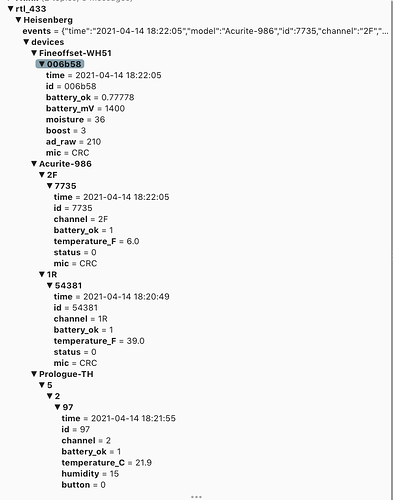I thought I would share a concept I’m working thru in regards to controlling my Hampton Bay fans via HomeKit/Homebridge. In my setup I already have a lot of Tasmota Devices so have a pretty robust MQTT Setup, and am using the homebridge-tasmota plugin which uses Home Assistant MQTT Discovery messages to create devices in HomeKit. And I also use node-red for a little bit of everything. And for a OpenMQTTGateway Device, I’m using an ESP32 based device with a CC1101 RF Transceiver connected.
My concept is to use Home Assistant MQTT Discovery message to create the FAN/Light accessory in HomeKit. So far this is working pretty good with my homebridge setup, but am thinking it should also work with a real Home Assistant setup ( with changes for your setup )
To create the FAN controller I’m injecting this Mqtt message via a node-red inject node ( Code 1000 )
{
"avty_t": "~LWT",
"name": "Test Fan 1",
"uniq_id": "3C71BF9E0770_F1_1",
"payload_high_speed": "{\"value\": 1119,\"protocol\": 6,\"length\": 12,\"delay\": 437,\"mhz\": 303.732}",
"payload_medium_speed": "{\"value\": 1135,\"protocol\": 6,\"length\": 12,\"delay\": 437,\"mhz\": 303.732}",
"payload_low_speed": "{\"value\": 1143,\"protocol\": 6,\"length\": 12,\"delay\": 437,\"mhz\": 303.732}",
"pl_off": "{\"value\": 1149,\"protocol\": 6,\"length\": 12,\"delay\": 437,\"mhz\": 303.732}",
"pl_avail": "online",
"pl_not_avail": "offline",
"speeds": [
"off",
"low",
"medium",
"high"
],
"cmd_t": "~commands/MQTTto433",
"device": {
"name": "cc1101-9e0770",
"model": "[\"BME280\",\"BH1750\",\"RF\",\"Pilight\",\"rtl_433\"]",
"manufacturer": "OMG_community",
"sw_version": "esp32dev_rtl_433",
"identifiers": [
"3C71BF9E0770-1"
]
},
"~": "home/cc1101-bbbbbb/"
}
On the topic homeassistant/fan/9e0770_F1_1/config
And for the light I’m injecting this message
{
"avty_t": "~LWT",
"name": "Test Ceiling 1",
"uniq_id": "3C71BF9E0770_LI_1",
"pl_on": "{\"value\": 1150,\"protocol\": 6,\"length\": 12,\"delay\": 437,\"mhz\": 303.732}",
"pl_off": "{\"value\": 1150,\"protocol\": 6,\"length\": 12,\"delay\": 437,\"mhz\": 303.732}",
"pl_avail": "online",
"pl_not_avail": "offline",
"cmd_t": "~commands/MQTTto433",
"device": {
"name": "cc1101-9e0770",
"model": "[\"BME280\",\"BH1750\",\"RF\",\"Pilight\",\"rtl_433\"]",
"manufacturer": "OMG_community",
"sw_version": "esp32dev_rtl_433",
"identifiers": [
"3C71BF9E0770-1"
]
},
"~": "home/cc1101-9e0770/"
}
On this topic homeassistant/light/9e0770_LI_1/config
In the files ‘9e0770’ is my OMG device
